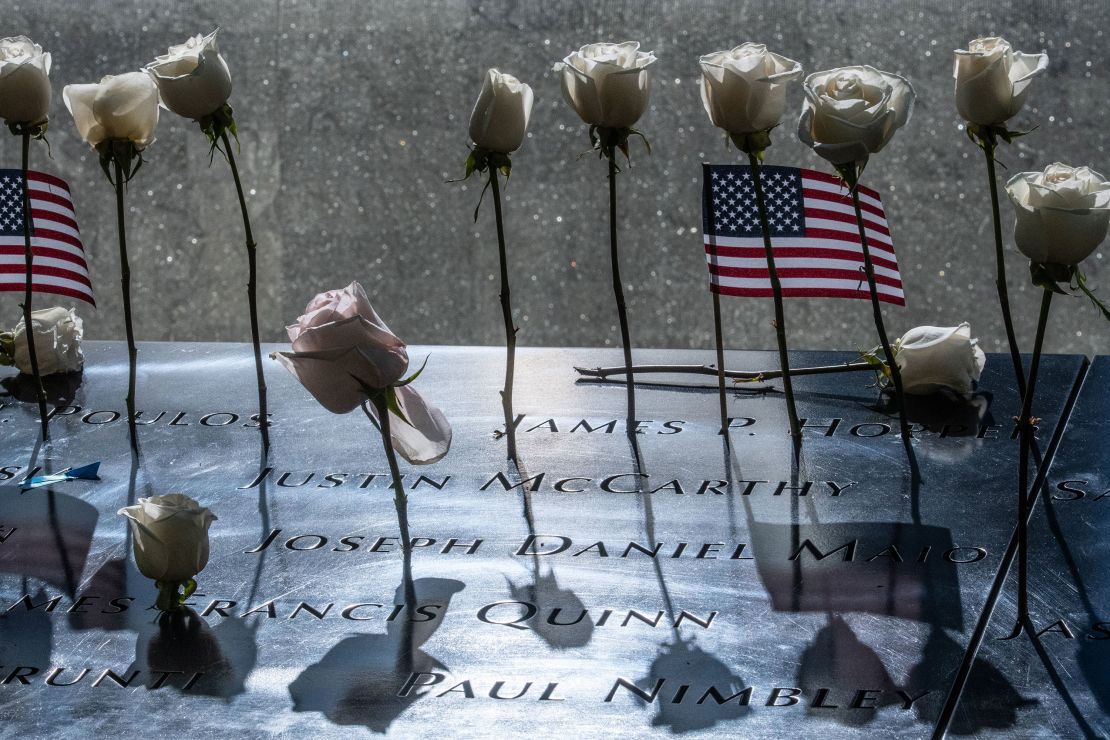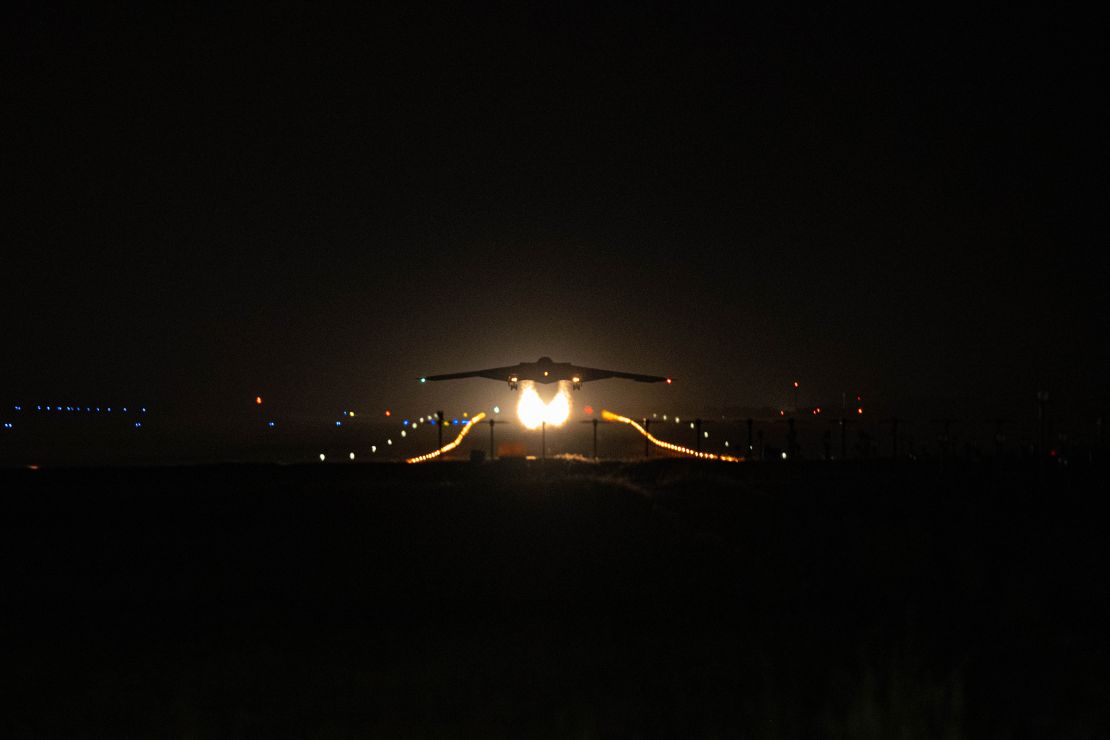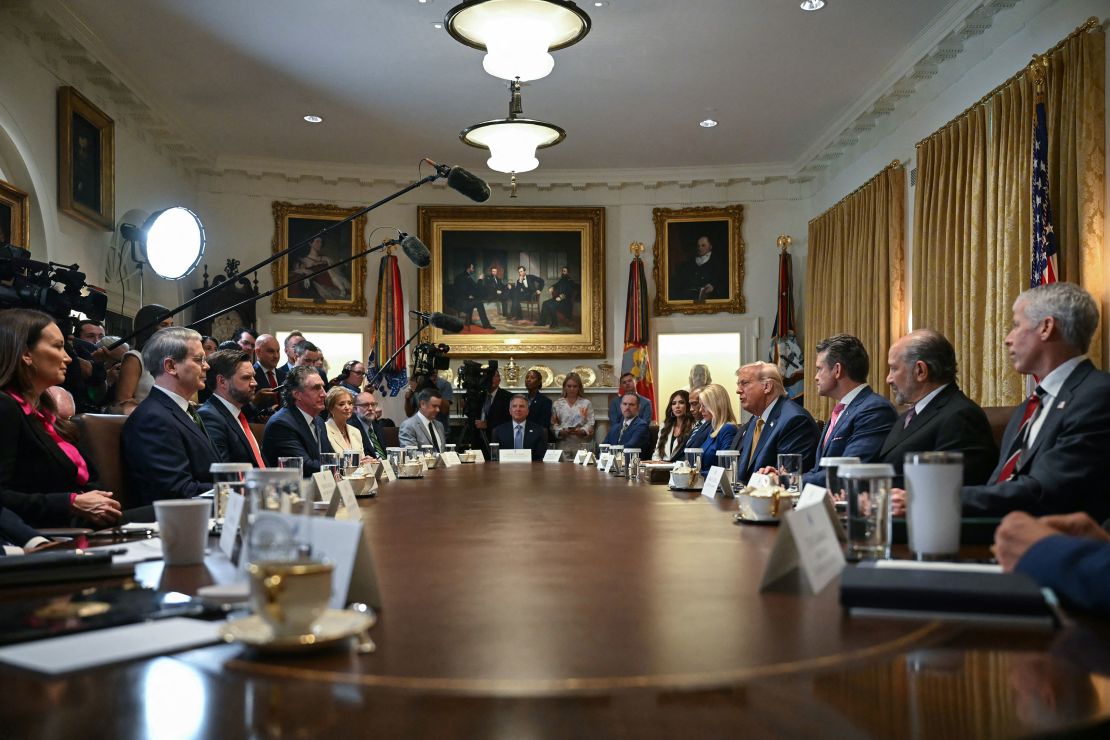CNN
—
Deep in one of America’s darkest hours, President George W. Bush warned that while the war on terror was started by others on 9/11, it would end “at an hour of our choosing.”
It took nearly a quarter of a century — but soon, one of the last tangible daily legacies of that conflict will disappear. America will extract a small measure of revenge on Osama bin Laden and his al Qaeda acolytes when the final traveler shuffles through airport security in their socks or stockings.
We’ve been taking our shoes off since 2006, when traveling by air became even more irksome amid fears of fresh terror in a nation still traumatized by the 9/11 attacks. But Homeland Security Secretary Kristi Noem said Tuesday that the requirement would end “effective immediately.”
New security technology will finally dim another memory of the global war on terror.
But we are still living in an age that bin Laden wrought.
Sure, the world is unrecognizable from that crisp September morning when terrorists seized airliners, transforming them into flying bombs that felled New York’s World Trade Center and turned the Pentagon into an inferno. Another jet — perhaps headed for the US Capitol — was brought down by heroic passengers over Pennsylvania.
A generation of Americans have grown up since. Bush’s post-9/11 wars were finally ended by his successors. His vision of the struggle against radical Islamic terrorism, framed as the battle between good and evil, did not, after all, turn out to be the organizing geopolitical principle of the 21st century. Instead, a new great power struggle is underway as the United States, China and Russia battle for primacy.
The controversies of the post-9/11 years — from a consuming national debate over whether torture was justified to the “Freedom fries” served in the US Capitol when the French opposed the invasion of Iraq — are mostly forgotten.
On a train headed to New York on September 11, 2001, business travelers first learned the Twin Towers had been struck on their pagers. Now, smartphones, social media and artificial intelligence are revolutionizing everyday life, the worlds of work and politics and the media.

The surge of national purpose following the attacks seems unfathomable in 2025. Does anyone think another great tragedy would forge such unity now?
And whereas Bush sent American troops out to force democracy at the point of a gun, democracy has more recently been threatened by his Republican successor at home.
The families of those who died on the battlefields of the global war on terror — or of the firefighters who rushed into the burning skyscrapers in New York — will never fully move on.
But many Americans — even those who remember the searing days of fear, the ache of national mourning and the dread of new attacks — feel 9/11’s shadow less viscerally now.
Dig deeper, however, and the tumultuous cultural and political changes unleashed on a day that shattered assumptions about the inviolability of the US homeland remain everywhere.
Bin Laden’s handiwork is embedded in the Trump administration’s DNA.
The 9/11 attacks and the disastrous turn of the wars in Iraq and Afghanistan they bequeathed transformed this country. The “real shock and awe” was not in Baghdad; it was at home.
Trump’s wars on the deep state and government were born in the post 9-11 era
It is often now forgotten that the initial stage of the war on terror was a success, as the Taliban, who harbored bin Laden, were toppled in Afghanistan. And there were no more mass casualty attacks on US soil by foreign terror organizations.
But the subsequent war in Iraq — which drew resources and focus from the Afghan war — changed everything.
Without the quagmire, it’s hard to believe that Barack Obama would have won the presidency in 2008. But the mostly unknown state lawmaker had a trump card — footage of a speech in which he blasted “dumb wars.”
And had Obama not been president, Trump probably wouldn’t have been, either. The first Black presidency gave Trump the chance to kindle the racist conspiracy theory about Obama’s birthplace that helped build his political base and backlash brand.
Like Obama, Trump took advantage of frustration at “forever wars” and busted nation-building in the Middle East. Many of his supporters came from rural towns that sent their kids to fight and die in Iraq and Afghanistan. Trump also fused simultaneously occurring frustration over the fallout of the 2008-2009 financial crisis to supercharge his populism and to exploit growing public frustration with the federal government, elite institutions and the Washington establishment.
Almost every day in his second term harks back to this political foundation.
Trump, for instance, on Tuesday won a significant victory in his effort to eviscerate the federal bureaucracy that many of his supporters despise, when the Supreme Court gave the go-ahead for mass firings in government — at least for now.
And the festering distrust on the right for US intelligence agencies, which can be traced back to mass surveillance programs in the war on terror, surfaced again this week, as MAGA activists eviscerated FBI and Justice officials for refusing to support conspiracies that Jeffrey Epstein, who died while awaiting trial on federal sex trafficking charges, was murdered. It was a case of the revolution eating itself: Some of those officials, including FBI Director Kash Patel and his deputy Dan Bongino, had been among Trump supporters who fanned claims of skullduggery in the first place.
Trump might have indulged his inner neoconservative and challenged the isolationism of the America First base with his raids on Iran’s nuclear program last month.
But the operation was a classic of the post-9/11 genre.

Sophisticated US jets came from over the horizon to drop their bunker-busting bombs and returned to the United States. No US boots were on the ground. Trump avoided the kind of quagmire that destroyed Bush’s second term, even if his claims to have “obliterated” the Islamic Republic’s nuclear program still cannot be verified.
It was ironic to hear an American president who may owe his political career to skepticism of foreign wars justifying the raid on the grounds that a tyrant regime could never be allowed to get nuclear weapons. Bush said much the same in Iraq.
But Trump had previously laid out his “America First” creed during a visit to Saudi Arabia earlier this year. “In the end, the so-called ‘nation-builders’ wrecked far more nations than they built — and the interventionists were intervening in complex societies that they did not even understand themselves,” Trump said.
Trump is not alone in his skepticism of endless foreign wars. Senior members of his Cabinet were forged by embittering experiences on foreign battlefields and amid a sense that Washington failed a generation of young Americans sent to war.
In Iraq, they saw friends die in a conflict justified by faulty intelligence. In Afghanistan, the US seemed to fight the same war over and over again — and it ended with massive US sacrifices squandered after President Joe Biden’s disastrous withdrawal, based on Trump’s first-term timetable, left the Taliban back in charge.

Defense Secretary Pete Hegseth came back from Iraq critical of diversity programs he believed hampered “warfighting” and of cases against US soldiers accused of war crimes. This shaped his approach when Trump elevated him from a Fox News sofa to run the Pentagon.
Vice President JD Vance, who served in the US Marines in Iraq, came to mistrust the globalist institutions and approaches of post World War-II foreign policy. His overt isolationism gave him great credibility to reassure the Trump base after the Iran strikes.
Director of National Intelligence Tulsi Gabbard, who still serves in the US Army Reserve, is skeptical of foreign wars and the agencies she oversees. The latter dates from her opposition to war-on-terror surveillance authorities.
She might have fallen out of favor in Trump’s inner circle. But Gabbard — as nominally the top US spy — remains an exemplar of the Trump base’s antipathy for the so-called deep state.
It’s hard to say how the post-9/11 generation’s turn in power will itself be leavened by global events and emerging threats. But there’s no sign of a course correction. And the Democratic Party has its own corps war-on-terror veterans awaiting power who are also skeptical of foreign adventurism.
We might be keeping our shoes on at airports soon, but September 11’s legacy will endure yet.

